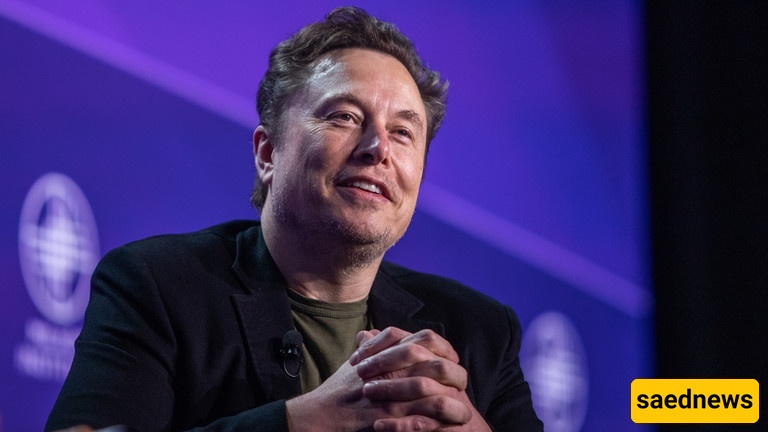SAEDNEWS: Elon Musk has claimed that the names of several prominent figures from the US Democratic Party appear in documents related to Jeffrey Epstein. This allegation, which so far lacks supporting evidence, has sparked a fresh wave of political and media speculation about the extent of Epstein’s influence and hidden connections.

According to SaedNews, citing Russia Today, in the increasingly polarized world of American politics, rife with partisan conflicts, ethical scandals, and media controversies, the name Jeffrey Epstein continues to cast a heavy shadow over the halls of power in Washington. Now, with recent statements from Elon Musk, the controversial billionaire and owner of X (formerly Twitter), that shadow has grown even darker. Musk recently made a direct claim, without providing evidence, that the names of several senior Democratic Party members appear in documents related to Epstein—an assertion that, while seemingly straightforward, has the potential to trigger a political earthquake ahead of the upcoming elections.
The issue began when part of the legal documents from Epstein’s case were released during a federal court lawsuit. These documents, which include victim testimonies and supporting evidence, mentioned several well-known figures from economics, media, and even politics. However, no direct proof has yet been presented linking these individuals to Epstein’s crimes. Nevertheless, the opaque and secretive nature of the case, combined with limited public access to all documents, has created fertile ground for rumors and speculation to flourish.
Amidst this, Elon Musk—known for his history of controversial statements—responded to a post on his own platform by claiming that several “major Democrats” appear on Epstein’s list and that mainstream media have deliberately censored this information. His remarks quickly spread across media channels and were welcomed by some conservatives as confirmation of a long-standing narrative about a “liberal elite alliance in corruption.”
However, a more nuanced analysis of the issue requires distancing from emotional reactions and taking a deeper look at the Epstein case and its place in American politics. Jeffrey Epstein was a powerful financier accused of trafficking underage girls to wealthy and influential politicians. His extensive connections with figures such as Bill Clinton, Prince Andrew, and Donald Trump have attracted media attention for years. His suspicious suicide in jail in 2019 further complicated the case and fueled numerous conspiracy theories alleging systemic cover-ups to protect political and economic elites.
Musk’s claim, within this context, is less grounded in concrete evidence and more fueled by public sentiment and distrust toward official institutions. This distrust, which has grown over the past decade—especially after numerous scandals in politics, business, and media—has paved the way for the acceptance of any anti-establishment narrative. For many citizens, particularly conservatives, mainstream media are accused of bias toward the Democratic Party and of covering up potential corruption. By questioning media credibility, Musk is once again reinforcing this perception.
Beyond partisan games, the key question remains: Are the names of prominent Democrats truly included in Epstein’s documents and deliberately concealed? So far, there is no clear answer. The federal judiciary has restricted public access to classified or private records, withholding many details. Supporters of this approach argue that protecting the privacy of victims and innocent individuals is a priority. However, opponents contend that full transparency is the only way to counter rumors and restore public trust.
Meanwhile, the role of the media has come under scrutiny. Major outlets such as The New York Times, The Washington Post, and CNN have taken a relatively cautious approach in covering the Epstein case. Rather than focusing on high-profile names, they have concentrated on legal proceedings, charges, and victims’ testimonies. Some, including NBC, have stated they will refrain from publishing any list of names without evidence or independent verification. While this approach is professionally justifiable, in the era of social media and unchecked information flow, it is often perceived by a large segment of the public as censorship and collusion.
In this environment, Elon Musk’s claim acts as a spark, reigniting the flames of distrust. As the owner of one of the world’s most influential social networks, he has the power to divert or inflame a national conversation with just a few words. This fact underscores his influence but simultaneously places a heavy responsibility on him—one he does not appear fully committed to.
On a broader scale, this situation reflects a deeper crisis in America’s political and media structures—a crisis in which the lines between truth and narrative, evidence and speculation, justice and revenge are increasingly blurred. The Epstein case is not merely a criminal matter; it is a test of institutional integrity, government transparency, and society’s resilience in facing bitter and complex realities.
Ultimately, if the names of politicians from either the Democratic or Republican parties do appear in Epstein’s documents, they must be disclosed with utmost transparency and within a legal framework. Justice should not be sacrificed for political convenience or partisan considerations. At the same time, baseless claims without evidence must not be allowed to become tools for political destruction or the weakening of public institutions.
The Epstein case remains open—not only in the courts but also in the political consciousness and memory of a nation. And what will ultimately resolve it is not the loudest claims on social media, but the truth, which though slow to emerge, must be revealed with clarity and courage.

